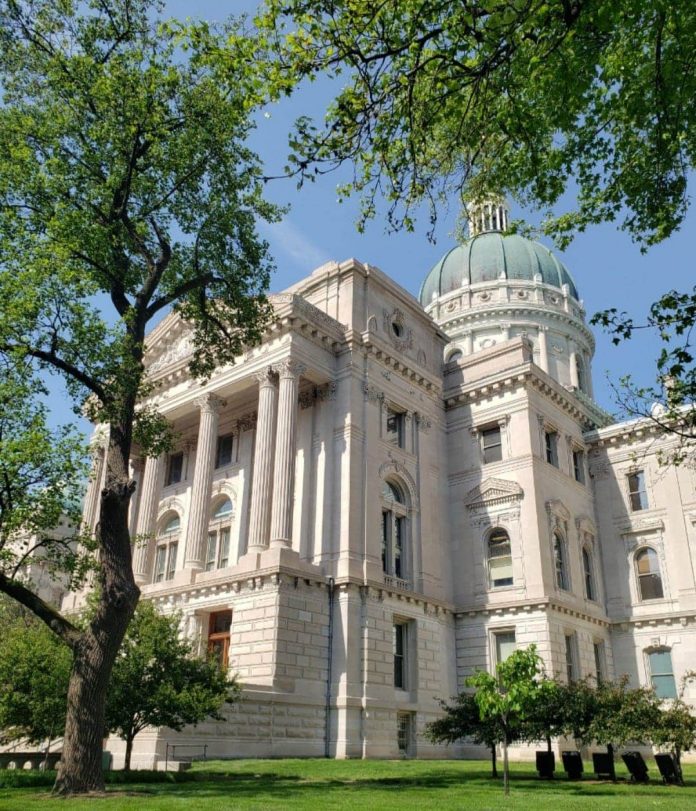ABORTION BAN BEING CHALLENGED IN THE COURT OF LAW
By Marilyn Odendahl
The Indiana Citizen
June 17, 2024
Indiana’s near-total abortion ban, signed by Gov. Eric Holcomb in August 2022, goes on trial Wednesday in Monroe County Circuit Court as medical professionals challenge the constitutionality of the statute.
At issue is whether the state’s restrictions on abortion, which allow a woman to terminate her pregnancy only in very limited circumstances, infringe on the Indiana Constitution’s protections on personal liberty. Plaintiffs assert in the case, Planned Parenthood Great Northwest, Hawai’i, Alaska, Indiana, Kentucky, Inc. et al. v. Members of the Indiana Medical Licensing Board of Indiana, et al., 53C06-2208-PL-001756, that the law violates Article 1, Section 1, of the state’s constitution by limiting when a woman can obtain an abortion to save her life or protect her from a serious health risk.
The bench trial is scheduled to last through Friday with the plaintiffs and defendants planning to call six witnesses each.
Noting the case has attracted substantial public interest and media attention, Special Judge Kelsey Hanlon from Owen County Circuit Court issued a decorum order outlining the rules for security, media and access to the courtroom that also banned photography and video during the hearing. Also, Hanlon’s order also said the court intends to livestream the proceedings.
On Friday, the plaintiffs and defendants filed a joint statement with the court, listing the undisputed and disputed facts in the case. The disputed facts include what health conditions and pregnancy complications could lead to a serious health risk and life-threatening risk for the woman; when is an abortion essential treatment; would an abortion be needed to prevent or resolve a serious mental health condition; and are physicians denying abortion care to patients whose serious physical and mental health conditions do not fit within the exceptions of the law.
History As A Defense
The plaintiffs are asking the trial court to issue a permanent injunction enjoining the enforcement of the law’s “serious health risk” provision. Specifically, the plaintiffs are seeking to block the law when it would prevent physicians from exercising their “reasonable medical judgment” and performing abortions due to health conditions which would require treatment that would endanger the fetus; could worsen or could cause debilitating symptoms during the pregnancy; and could cause lasting damage to the woman’s health, even after giving birth.
In their amended complaint, the plaintiffs argue, Indiana’s abortion law’s “extremely limited Health and Life Exception unnecessarily restricts access to abortion care inconsistent with medical consensus, chills the provision of medical care, and will inflict serious harm on patients already facing extraordinarily difficult circumstances.”
Defendants point to history and contend the framers of the Indiana Constitution did not intend to permit abortions in circumstances prohibited in the state’s abortion law. In fact, the defendants argue, the framers enacted more stringent limitations on abortions.
“Rather than engage in the required historical analysis, plaintiffs lob accusations about how (the Indiana abortion law) supposedly prevents abortions they deem ‘necessary,’” the defendants state in their response brief. “By ‘necessary,’ however, they do not mean ‘medically required.’ … Instead, plaintiffs consider abortion to be ‘necessary’ whenever a woman prefers abortion to childbirth.”
The American Civil Liberties Union of Indiana, along with attorneys from WilmerHale, the Lawyering Project and Planned Parenthood Federation of America, are representing the plaintiffs. The Indiana Attorney General’s office is representing the defendants. Attorneys from Schaerr Jaffe joined the defense team in December 2023.
In advance of the trial, Planned Parenthood released a joint statement reiterating what it sees as the potential harm Indiana’s abortion law can cause.
“This lawsuit seeks to restore access to health care to pregnant Hoosiers currently endangered by the unconstitutionally limited scope of the health or life exception to Indiana’s abortion ban,” the joint statement from Planned Parenthood Federation of America, Planned Parenthood Great Northwest, Hawai‘i, Alaska, Indiana, Kentucky, ACLU of Indiana, All-Options, the Lawyering Project said.
“Drafted in a breakneck special legislative session in 2022, the law’s exceptions were intentionally made as narrow as possible to appease state legislators arguing for a ban with no exceptions. As a result, Hoosiers with serious health complications have been forced to endure unjustifiable suffering due to miscarriages, ectopic pregnancies, and other pregnancy-related issues or leave the state to access appropriate care. Hoosiers deserve, and the Indiana Constitution demands, better.”
Indiana Right to Life did not release any pre-trial comment.
Indiana Supreme Court Finds Constitutional Right To Abortion
The Indiana General Assembly restricted access to abortions during a special session in the summer of 2022, less than two months after the U.S. Supreme Court issued its ruling in Dobbs v. Jackson Women’s Health Organization, which held the U.S. Constitution does not provide women the right to an abortion. Despite strong opposition in the Indiana legislature, including some Republican lawmakers joining their Democratic colleagues in voting against the restrictions, Senate Enrolled Act 1 was signed into law hours after the measure landed on Holcomb’s desk.
SEA 1 prohibits abortions, except in cases of rape or incest, lethal fetal anomaly, a serious health risk to the pregnant woman or to save the mother’s life.
Also, the law requires that all abortions be performed only in a licensed hospital or an ambulatory surgical center owned by a hospital. In addition, a physician who performs an abortion prohibited by the law could face civil and criminal penalties, including up to six years in prison.
The plaintiffs immediately filed their original complaint weeks after SEA 1 was signed into law. In September 2022, Hanlon granted their motion for preliminary injunction, blocking the new abortion statute from taking effect.
Hanlon agreed with the plaintiffs that SEA 1 did materially burden women’s and girls’ right to bodily autonomy in violation of Article 1, Section 1’s protection of a person’s inalienable rights including liberty.
The state appealed directly to the Indiana Supreme Court and in a 4-1 decision issued in June 2023, the justices nixed the preliminary injunction and upheld the law. However, the majority also found Article 1, Section 1 of the state constitution does offer a limited protection for abortion.
“While Section 1 protects a woman’s right to an abortion that is necessary to protect her life or to protect her from a serious health risk, the provision does not protect a fundamental right to abortion in all circumstances,” Justice Derek Molter wrote for the majority. “And it is undisputed that protecting prenatal life falls within the State’s broad authority under Article 1, Section 1 to protect the public’s health, welfare, and safety.”
Fight Was Not Over
Following the Indiana Supreme Court’s ruling, the injunction was lifted and the state’s abortion law went into effect in August 2023.
However, declaring the fight for abortion rights was not over, the plaintiffs filed an amended complaint in Monroe Circuit Court in November 2023. They modified their Article 1, Section 1 claim from arguing that the state’s near-total abortion ban prevented women from exercising their fundamental right to privacy to asserting the law violates the guarantees of liberty. Also, they dropped their claims that the abortion statute violates the Indiana Constitution’s equal privileges and immunities clause of Article 1, Section 2 and prohibition against vagueness in Article 1, Section 12.
Two of the original plaintiffs – Women’s Med Group Professional Corp. and Whole Woman’s Health Alliance – have been dismissed from the case.
Citing to the finding by the Indiana Supreme Court that Article 1, Section 1 provides some right to abortion, the plaintiffs argue the new law does not adequately protect Hoosiers’ constitutional rights.
“The (Indiana) Supreme Court was correct that (SEA) 1’s Health or Life Exception may not be broad enough to adequately protect the constitutional right to an abortion necessary to save a patient’s life or protect a patient from a serious health risk,” the plaintiffs said in their brief that accompanied their amended complaint. “By allowing abortion only in the most extreme circumstance, where the patient’s pregnancy poses a risk of ‘death or serious risk of substantial and irreversible physical impairment of a major bodily function,’ (SEA) 1 violates the right to protect oneself from serious health risks guaranteed by Article 1, Section 1.”
The defendants, again, assert the new abortion restrictions are based on the framers’ intentions, long-held state law limiting access to abortion care and Indiana Supreme Court precedent.
“(SEA 1) permits abortions in more circumstances than were permitted throughout most of Indiana’s history,” the defendants stated in their response brief, noting exceptions for rape, incest and lethal fetal anomaly. “Thus, to declare S.B. 1 unconstitutional, the Court would have to declare all abortion regulations from 1836 to 1972 unconstitutional as well. But those regulations supply the best evidence for determining how those who drafted and ratified Article 1, Section 1 thought it applied in the abortion context.”
FOOTNOTE: Dwight Adams, a freelance editor and writer based in Indianapolis, edited this article. He is a former content editor, copy editor and digital producer at The Indianapolis Star and IndyStar.com, and worked as a planner for other newspapers, including the Louisville Courier-Journal.
The Indiana Citizen is a nonpartisan, nonprofit platform dedicated to increasing the number of informed and engaged Hoosier citizens. We are operated by the Indiana Citizen Education Foundation, Inc., a 501(c)(3) public charity. For questions about the story, contact Marilyn Odendahl at marilyn.odendahl@indianacitizen.org






.
Any reasonable person.
ANY reasonable person!!!!…Would acknowledge there needs to be SOME exceptions to abortion rights. If the woman is going to die during birth (this risk is real, and it happens every single day in families in Indiana). If the woman is raped and impregnated by the rapist. There are others.
There are people in Indiana who say, “No exceptions. None.”
And those people?
Listen up Indiana Women Voters!
These people think you are property who do not have rights, and they do not consider you human, much less a citizen voter empowered with equal rights under the law.
The No-Exceptions people? These people think women are no more than farm animals.
These decisions must be left in the Family. Women are not farm animals, and there must be exceptions for the life of the Woman? None? There is no determination, whatsoever, except today’s Republican Party hates women, if the GOP supports a no-exceptions ban.
Yet the innocent babies are nothing but animals to be killed……by the marxist demoncrat party ……..
The damage has been done.
One could believe women vote accordingly in November. Including those who sit silently in the church pews every Sunday.
Republicans know this and should be concerned.
Comments are closed.